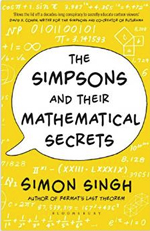'The Simpsons and their mathematical secrets'

The Simpsons and their mathematical secrets
by Simon Singh
The Simpsons and their mathematical secrets proves that you can be both good at maths and funny. This interesting and quirky little book works through two decades of prime material to shine light on the nerdy little secrets of The Simpsons. Surprisingly a large number of The Simpsons writers are prestigious mathematicians in their own right who have turned their problem solving skills to creating jokes and coming up with clever plot lines.
Whilst the writers may have turned their attention away from the lofty heights of mathematical research their passion for the subject is evident by the vast number of episodes where little maths jokes have been hidden. This book dutifully works its way through these little secrets, expands on them and gives a little detail on the mathematical writers' backgrounds.
Where The Simpsons writers manage to cleverly incorporate mathematics into their stories Singh's writing is very formulaic: chapter = episode description + background of the maths in it + biography of the writer who came up with the gag. This is then repeated for the whole book with no particular narrative connecting the chapters. This may have read nicely if the chapters were short and punchy. But the material feels like it is stretched too thin to remain engaging for the full 200 pages. Indeed Singh delves into Futurama, which is a sci-fi spin off of The Simpsons by the same writers. It is no surprise that Futurama, The Simpsons' nerdier brother, is packed full of less than subtle maths and physics references.
Overall The Simpsons and their mathematical secrets is a fairly interesting and enjoyable read with a few intriguing stories about mathematics and the writers' back stories. This is likely to be an enjoyable read for any Simpsons fan with an interest in maths or puzzle solving. The achievements of the writers go to show that a degree in mathematics can open doors anywhere and everywhere. This book is an ideal way to get a teenager excited about maths and open their eyes to the fun side of maths and some of its uses (trust me they exist). Anyone with a background in mathematics or experience with popular maths may find this book a little dull and repetitive.
- Book details:
- The Simpsons and their mathematical secrets
- Simon Singh
- paperpack — 272 pages
- Bloomsbury Paperbacks (2014)
- ISBN: 978-1408842812